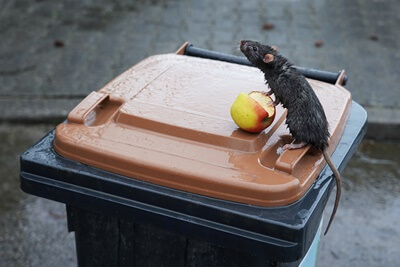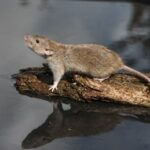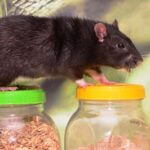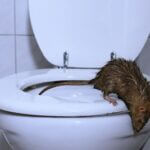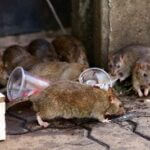Many of us report that rats appear in and around our homes during storms and heavy rain.
Many factors are attributed to this phenomenon, but the truth is that rats hate the rain. So, they often flee their usual habitats to seek shelter in warm, dry, and safe human dwellings.
Due to flooding and the associated risk, rats come out in the rain. A sudden rainfall can wash away rats and destroy their nests.
Also, the loud noise from a heavy downpour or thunderstorm can frighten rats, leading to them instinctively seeking a quieter, safer temporary location.
During a long rainy season, food sources can be reduced, forcing rats to look elsewhere for sustenance. After a heavy downpour, more rats than normal means they’re looking for washed-away food.
Do Rats Like The Rain?
Rats dislike rain because it is scary, especially if there’s a heavy, noisy downpour.
Here are some of the reasons that rats hate rain:
Habitat Damage
Severe rain can disrupt or destroy rats’ burrows.
Mild flooding can fill their nests, while severe flooding can wash away rats and their nests.
If the rain is heavy, it may be hard to see, hear, or navigate efficiently.
Getting Wet
Rats dislike being damp and wet.
They’ll tolerate it to swim from one location to another or during emergencies when they must travel to find shelter from the rain.
However, rats prefer to remain dry and warm. Getting openly caught in a rainstorm makes this impossible, as they’ll be weighed down and wet due to the downpour.

Vulnerability of Young Rats
Rain is more dangerous to young rats and newborn pups because they may be unable to leave their nests and drown.
Young rats aren’t as experienced and may struggle to find shelter if they move about when the storm begins. Swimming will be harder, and they’ll likely freeze in the cold rain.
Lacking Food
Severe rainstorms may destroy crop fields and flood garbage bins.
This leaves rats with less to eat, as they prefer dry foods. Rats won’t immediately notice this difference and may not directly associate a lack of food with increased rain.
Freezing
During the colder months, rain poses more danger to rats.
Being soaked in the cold can lead to a rapid fall in body temperature. Cold rain and sleet can cause this all by themselves, even if the rat doesn’t get overly wet.
This leaves rats feeling extremely cold and uncomfortable while also triggering cold stress. According to Experimental And Therapeutic Medicine, cold stress can make rats susceptible to the following:
- Upper respiratory tract infections.
- Autoimmune diseases.
- Death.
Loud Noise
The heavy sound of the rain can put a rat on edge when it’s pouring.
It’ll struggle to hear the sounds of predators, especially at a distance. Its line of sight will be limited, and rain can be accompanied by thunder and lightning.
Since rats are already on guard, they become even more distressed.
Does Rain Bring Out Rats?
Rain motivates rats to escape from their homes and aim for higher ground near human settlements because they instinctively know this will safeguard them against flooding and storm damage.
They’ll choose a human home for the following reasons:
- Warmth.
- Cover from the rain.
- Hiding spots like trash cans, decks, house skirting, flower pots, and yard equipment.
- Food from leftovers, a dirty bathroom or kitchen, or lawn litter.
- Safe water sources so that the rats don’t need to contend with harsh weather to drink.
- A lack of traditional predators, like snakes and birds of prey.
- New nesting spots, like the inside of walls, decking, and sheds.
Once it begins to rain, rats will retreat to your home.
Where Do Rats Go During Rain?
Rats usually move into or around homes during rainy seasons. They can also be found in hotels, abandoned buildings, and municipal garbage collection centers.
Brown rats may find new homes in sewer pipes and blocked drainages. Meanwhile, black rats will find the highest spots, such as rooftops and treetops.
In the average home, you’re more likely to find rats in:
- Heaps of firewood.
- Piles of trash.
- Trash cans.
- Dumped grass clippings.
- Pet feeding dishes.
- Food stores (especially in garages or sheds that aren’t often checked).
- In the secluded corners of your home, shed, garage, deck, porch, or other less-checked areas.
- Inside cardboard boxes or unclosed plastic containers.
- In crawl spaces and basements, especially near appliances or in dark corners.
- Under refrigerators.
- Behind washing machines and dryers.
Rats will rush to these hiding spaces immediately when it begins to pour.
Will You Get More Rats After Rain?
It makes sense that you’ll observe an increase in rat activity just before it rains or during the storm.
You may be confused about why there are more rats afterward, with the number climbing throughout the rainy season. Is there something about the water, climate, or storm patterns that make rats thrive?
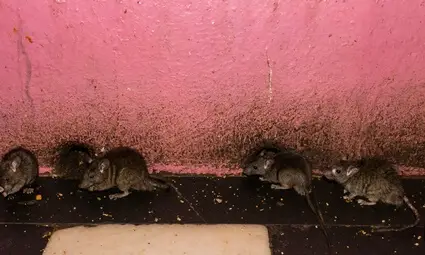
Food Moved Due To Erosion
Heavy rains can wash away grass and crop seeds, which are favored foods. For this reason, rats tend to gather in areas where seeds are deposited.
These areas include roadside culverts and edges of drainage systems, which provide shelter. When the rats deplete food in these places, they’ll look elsewhere, usually nearby buildings.
Grass Growth
The production of grass seeds increases during heavy rain, leading to taller and thicker grass.
Although the grass won’t shelter rats when it rains, it provides cover from predators and humans. It can also be a valuable source of food.
Damage
Excessive rain can damage pipework and plumbing networks, allowing rats to enter buildings. Once rats enter your house, getting them out is hard.
Storm Debris
The flooding following heavy rain will carry debris from the higher parts of an area to the lower parts. Depending on the size of the piles, they can act as shelter and food for rats.
Rats come out in the rain to improve their chances of survival and find food. The wild can be unforgiving during a rainstorm, so rats seek out your home as a reprieve. If more rats appear during or before a storm, they seek food and safety.

